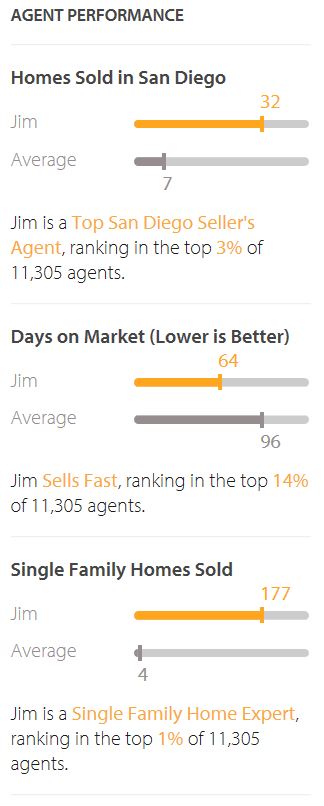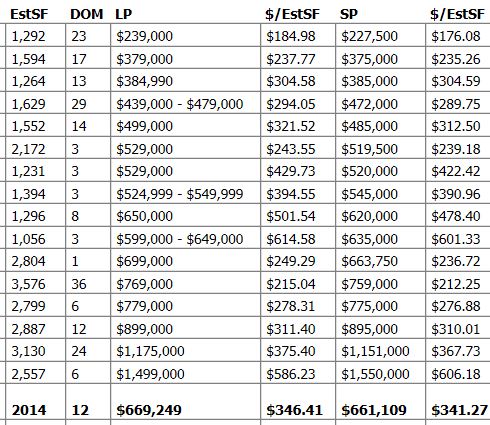I am a fan of transparency.
The two best attempts of creating an agent-ranking website got shot down by realtors themselves. But outside entrepreneurs keep plugging away, and one of them could find the right mix and hit the jackpot some day.
One website called homelight.com has agent data. To see what they presented, I looked up my own name. They don’t go into details of where they found this data, or how to interpret this data. No time periods are given either:
Realtors complained about accuracy, but this is what we get instead – outsiders who are running an agent-referral business and using our names and numbers for eyeball bait. They hope you’ll inquire about an agent, submit your contact info, and then they will send you two other agents who are paying them a referral fee of 25% to 30%.
I don’t know where this company gets their data. I’ve sold around 32 homes within the city limits of San Diego, but did they get that straight from the MLS? A title company?
The average days-on-market should only be for listings sold – unless a longer average means the agent’s buyers are waiting out the sellers more effectively. On the MLS, my average days-on-market with sellers is 29 days, and buyer sales average 50 days so I don’t know where they got the 64.
Who knows about the 177. I have more than that on my Zillow count but they may have taken their number from a few years ago? BTW, Zillow finally corrected their sales counts. Each agent has their sales tally on their Zillow page, but Zillow’s 12-month timer must have broke because recently they had displayed my count for the last 17-18 months. I doubt any agents complained! It is back to the 12-month count now.
Two broker-generated listing portals are being developed currently, and they should include agent statistics right off their MLS. They will have the accurate data at their fingertips, so let’s create a depository of identical stats on each agent so the public can educate themselves.
Would it favor the old veterans who have more stats?
It might impress the analytical people who crave data, but consumers should be willing to consider the whole package. If photos and video were included in each agent page, any realtor could create a compelling case on why people should use them.
If agents don’t develop our own website, others like Zillow will keep doing it for us. Or we’ll leave it the way it is now, with agents being able to say whatever they want about themselves because there’s no public way to verify.
Recently an agent mailed out a fancy brochure about being a rural-property specialist. But a simple MLS search of her sales revealed that she had never sold a rural property. She said she had 15 years experience, but she got her license four years ago. I guess she could have been an assistant, or sold in another state, but if you haven’t sold one here yourself in the last four years, then you aren’t a specialist. Yet many agents get away with it because there’s no transparency.
Let’s provide a simple and identical set of data on every agent, and give explanations on how to interpret them.
These are my 16 listings sold over the last 12 months:
Possible interpretations by consumers:
1. He only sold 16 listings in the last 12 months?
The blog drove a lot of buyers my way during the downturn, and I’ve been scrambling to generate organic listings since the REO listings dried up.
2. He sells them too fast.
Sellers who think it should take months to sell a house will think I’m giving them away. But it is more a reflection of pricing accuracy and a hot market.
3. He doesn’t work my price range.
4. He doesn’t work my area.
5. He doesn’t sell my size of house.
6. He’s too busy. (I’ve sold twice this many)
7. He’s not busy enough.
8. He only works with sellers (I closed 17 buyer sales).
If each agent inputted their own explanations, they could add texture to their stats, and make their case why they should be hired. Include a video presentation too (Zillow does).
Consumers would be making educated decisions, and we as agents should not only applaud that, we should insist on it. Agents would have to get better at selling themselves, and those that do would get the business, regardless of experience or sales history.
I am uncomfortable displaying my stats – people are prone to poke holes and find faults. It’s why realtors don’t want data released! But we should all get used to our sales histories being public, because one way or another it is happening – with or without us. Let’s make the best of it!
Get Good Help!







I would suggest that “days on market” is a good metric when it is between 30% and 50%. Less is not a compliment and more is not a good financial decision. That said Jim should explain more why.
To answer your question about where the data is coming from…
It’s not hard to pull data from any website, drop it into a database, and redisplay it in different ways. Here’s an off the shelf solution that does it for Real Estate. http://www.screen-scraper.com/scrape_real_estate_data.php And this is just off the shelf stuff. If you were to write the screen scrape yourself it can get even more detailed. The more data gathered over time the more valuable it becomes. (to someone)
You correctly identified how they’re using the data. (selling targeted leads) Unfortunately or fortunately depending on your point of view either get involved or be left behind.
Realtors should get in front of this now or others will do it for them.
On the HomeLight webpage they show that they are partnered up with ColdwellBanker, Century21, Sotheby’s, KellerWilliams, BershireHathaway and ReMax
Interesting that most of their “recommended” agents come from these agencies! 🙂
Caveat emptor and “Get Good Help!”
Yes, they are happy to (ab)use other brand names to help lure customers.
You don’t get a great agent when they are paying out 30% of their fee to a referral service – you get an assistant who is cutting their teeth on you.
Here’s more from Rob on the broker-portal in development:
https://www.inman.com/2015/08/05/broker-portal-debate-visionary-or-stupid-idea/